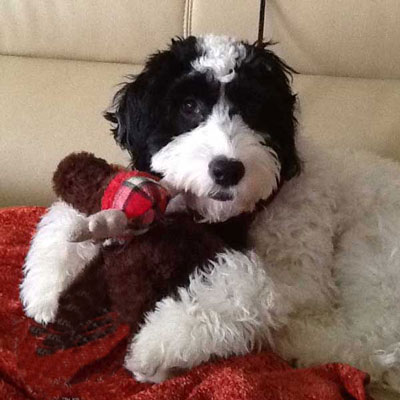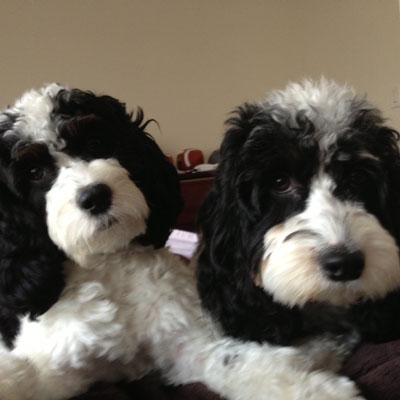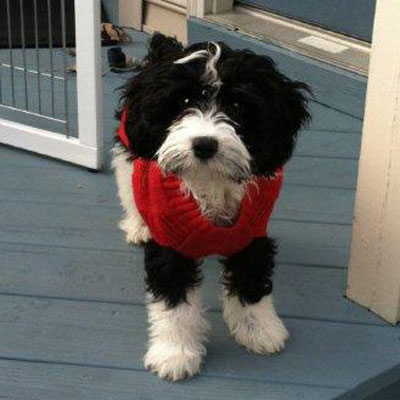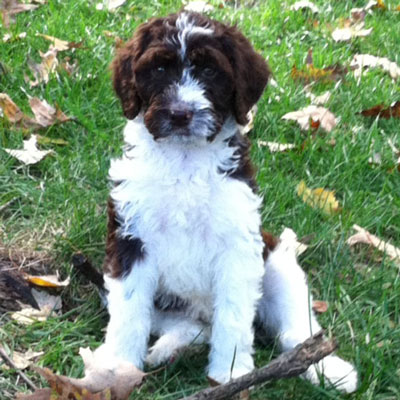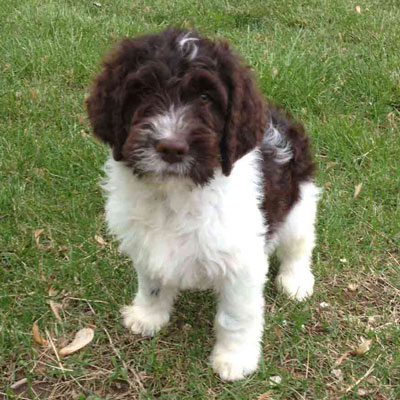Pup Prep
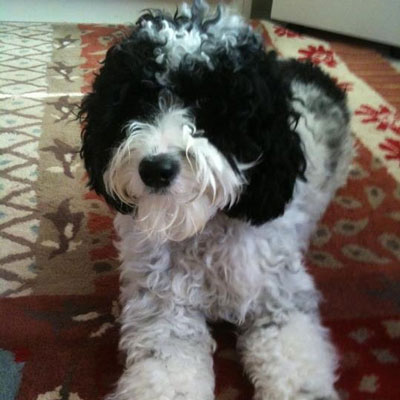
As many of our Old Mill families know, I’ve advised for years but only recently experienced the joy (challenge) of having a puppy in the house. I’m including a list below of some recommendations for puppy proofing your home. In all honesty, I didn’t follow some of the suggestions. I taught my puppy not to climb the stairs, I didn’t block them. I taught him to stay out of the trash cans. I provided a (cute) container of toys in each of the three rooms I knew I would spend the most time with him when he was little. He seemed to learn on his own that the items in the container were his to chew and toss at will – I then corrected him if he attempted to go after an unacceptable item. The one thing I’ve never allowed to be a temptation are my shoes – good heavens, we have to protect the shoes!
We did keep a very close eye on our puppy around electrical cords that simply couldn’t be moved, he wasn’t in a room alone. At one year, he still plays with his toys from the buckets – they shuffle around when he goes to another room to find the one he wants. He continues to respect our wish that he stay downstairs, even though he goes to the basement with us. I still keep my shoes out of reach.
Certain types of furniture can be dangerous to puppies. Reclining chairs can trap a curious pup that crawls inside. Rocking chairs can roll on a puppy’s tail or foot, so make sure your pup isn’t sitting near the rocker when you decide to take a break.
- Slippery floors. Puppies in the early stages of learning to walk are not steady on their feet and are often clumsy. Slick floors, such as linoleum or hard wood, can result in slips and falls. Cover the floors with rugs to help your puppy with his footing. Don’t encourage running on slippery surfaces.
- Stairs. These can pose another risk to your puppy. Not only can they slip and fall down the stairs but the stairs also lead to other areas of the house out of your watchful eye. Place baby gates so that the puppy does not have access to stairs.
-
Electrical cords. Puppies love to chew and electrical cords need to be off limits. Electrocution can occur easily and cause injury or even death. Tie up loose electrical cords or conceal them in hard plastic or rubber runners purchased at the hardware store.
- Small objects. Not only do puppies love to chew on cords, but small objects are also a danger. Swallowed coins, pins, needles, rubber bands, paper clips, staples, nails, screws, yarn, thread, dental floss, earrings and other small jewelry, bells and small balls, left lying around can lodge in your puppy’s digestive tract. Keep them safely out of your pup’s reach.
- Children’s toys and clothing. Puppies love to chew and toys and clothing are typical favorites. Your child’s bedroom and playroom should be off limits unless the puppy can be supervised. Keep clothing and shoes safely stored in cabinets, drawers or hampers.
- Bathrooms. This area of the house poses its own risks. Bathroom trashcans, especially in homes with women, are very tempting to puppies. Though what they choose to ingest may not seem “choice,” remember that puppies are not too picky. Immediately discard any bulky bathroom items, such as sanitary supplies, to the outdoor trashcan. Dirty clothes should not be left lying around and towels need to be kept out of reach. Medications should be safely stored away and toilet lids down if toilet bowl cleaners are used. (Actually, keep them down anyways – do you really want your puppy drinking from the toilet?)
- Windows. Keep your dog from accidentally falling or escaping through an open window by fastening window screens securely.Outdoor Hazards
- Big Bad World. Don’t leave your puppy outside unattended. Escaping from the yard, poisonous plants and the anxiety of the being in the big backyard alone can be dangerous. Make sure you remove or fence off all potentially dangerous plants. Check your fence for holes and keep him company until he learns his boundaries.
- Pool or Pond. Your curious and sometimes awkward pup can fall into the pool and not be able to get out. Keep the pool or pond fenced off and don’t allow unsupervised access. Consider getting a pool alarm that sounds if something falls into the water.
- Garage or Storage Sheds. Too many dangerous items can be found in garages and storage areas, including fishhooks, fishing lines, chemicals, herbicides and various garden supplies. Automotive items, such as antifreeze (which dogs are attracted to) can also pose a threat. Keep these areas closed and locked to prevent your puppy from getting into serious trouble.Potential Poisons
- Plants. Many common household and yard plants are poisonous. They range from lily-of-the-valley and daffodils to rhododendron and hydrangea. Eating them causes symptoms ranging from stomach upset to convulsions or death.
- Chemicals. Chemical cleaning products and garden supplies should never be left out. To keep your puppy from opening the cupboards where you store cleaning products, attach safety latches to the cupboard doors.
- Ashtrays. Cigarettes and even cigarette ash contain nicotine and are toxic to curious puppies if ingested. Keep all tobacco products safely stored away and never leave cigarette butts or ashes in areas that your puppy can reach.
- Antifreeze. All antifreeze is poisonous. Even antifreeze made of propylene glycol is toxic if your dog ingests enough of it, so keep antifreeze spills cleaned up.
- Drugs. Over the counter drugs as well as prescription medicine are tempting and toxic to your puppy. Keep all medicines out of your puppy’s reach and don’t let your dog play with pills that might have fallen to the floor. Pick them up and throw them away.No house is 100 percent safe, but you can reduce risks by creating a dog-friendly environment. Be vigilant. Keep potential hazards at a minimum. Get down on the floor and look around at puppy eye level. See his world as he would see it to help make your pup’s new home safe.
